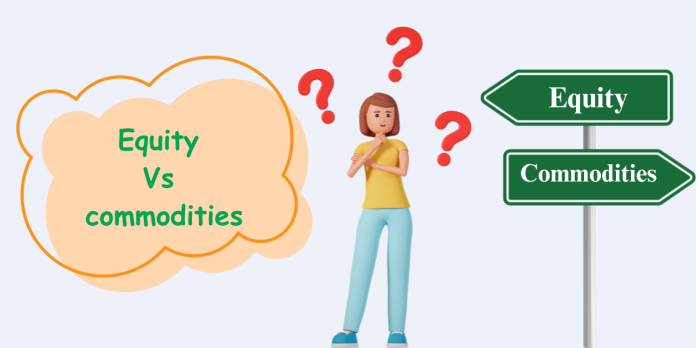Raahul, a fervent market enthusiast, finds himself at a crossroads, grappling with the decision between two compelling choices: diving into the world of equities or delving into the intricacies of commodities. This pivotal choice is intimately connected to Raahul’s individual investment goals, risk tolerance, and the envisioned time horizon for his financial journey.
Let’s understand equity markets
Equity markets, often hailed as the heartbeat of financial systems, represent ownership in companies. Buying a stock translates to acquiring a stake in the company’s prosperity. While the allure of high returns is undeniably appealing, the roller-coaster ride of stock prices introduces an element of risk. Stock prices can swing dramatically, presenting the risk of financial setbacks. Yet, over the long haul, equities have historically outperformed other assets, including bonds and commodities.
Advantages of Equity Markets:
- Potential for High Returns: The allure of significant returns over the long term is a primary attraction of equity markets.
- Diversification: With a multitude of stocks to choose from, diversifying a portfolio becomes a feasible strategy to mitigate risk.
- Liquidity: Stocks, known for their liquidity, offer the convenience of easy buying and selling.
- Ownership in Companies: Buying a stock is akin to claiming a piece of the company, fostering a sense of ownership and participation in its success.
Disadvantages of Equity Markets:
- Volatility: Stock prices are prone to significant fluctuations, bringing the risk of financial losses.
- Recession Sensitivity: Economic downturns can impact equity markets, leading to declines in stock prices.
- Research Requirements: Successful equity investment demands diligent research, a time-consuming and challenging endeavour.
Understanding Commodities
It is raw materials traded on exchanges, that offer a unique avenue for investment. Gold, oil, and wheat are among the diverse array of commodities enticing investors. Often considered an inflation hedge, commodities exhibit price surges during periods of inflation.
Advantages of Commodities:
- Inflation Hedge: Commodities serve as a hedge against inflation, with prices tending to rise in inflationary environments.
- Diversification: Commodities diversify portfolios, as their price movements don’t always align with stocks and bonds.
- Tangible Assets: Possessing physical form, commodities provide investors with tangible assets.
- Limited Supply: Certain commodities, like gold, boast a finite supply, which can stabilize their prices.
Disadvantages of Commodities:
- Economic Dependency: Commodity prices often hinge on global economic health.
- Storage Costs: Owning physical commodities necessitates bearing storage expenses.
- Speculation Impact: Speculation in commodity markets can lead to increased price volatility.
In conclusion, the choice between equity markets and commodities is not a one-size-fits-all decision. Both avenues present opportunities and challenges, each suited to different risk tolerances and financial aspirations. Equities promise the potential for robust returns but accompany higher volatility.
Commodities, offering diversification and inflation protection, come with their own set of risks tied to economic dependencies and speculation. Ultimately, the optimal investment choice hinges on an individual’s unique circumstances, risk appetite, and long-term goals. It’s a journey of financial self-discovery where the destination is shaped by the choices made along the way.
Disclaimer: This blog has been written exclusively for educational purposes. It is based on several secondary sources on the internet, and is subject to changes. Please consult an expert before making related decisions.


